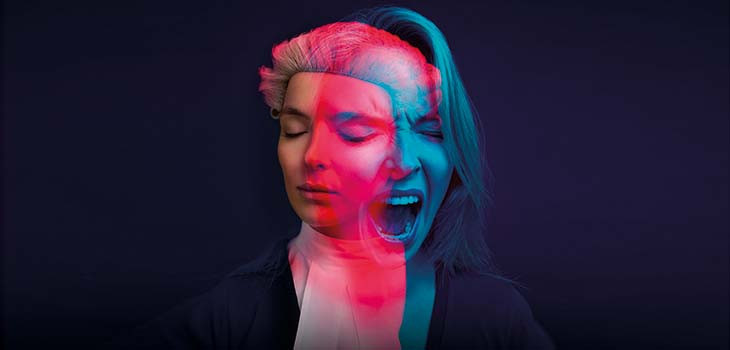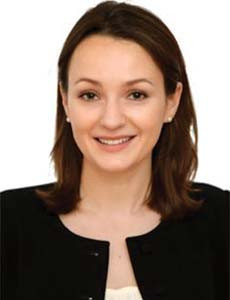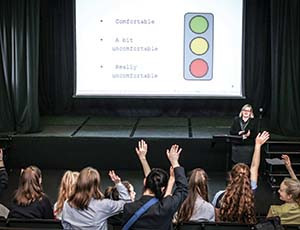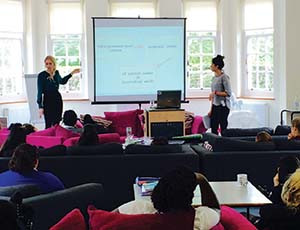*/

In 2014 Kate Parker, then a paralegal at Peters and Peters, now a successful tenant at 5 Paper Buildings, was having a drink with a university friend. The conversation they had that night set off a chain of events that has had extraordinary, important and far-reaching consequences. Kate’s friend told her in a throwaway remark that she had been to a work event the previous week where she had been groped by her male boss. Her friend’s reaction was that this was the reality of ‘just being a woman in the workplace’; while it was an incredibly unpleasant and stressful experience, it was something almost every woman suffers. Even though the friend was a highly educated Cambridge graduate she seemed resigned to it, which Kate says she found a bit depressing.
Kate’s view, ‘very fresh from law school’, was different: ‘This is not what it should be like being a woman in the workplace.’ What was being described was a sexual assault, a serious criminal offence carrying up to a maximum of 10 years. It shouldn’t be happening and women, particularly young women at the start of their careers, should not have to put up with it or risk career damage by complaining. The Bar has long experience of this sort of behaviour and nothing being done about it.

Kate reframed her friend’s experience from a legal perspective and over a couple of glasses of wine they got to thinking about how this endemic behaviour could be challenged and changed. Kate said to her friend: ‘I really think we ought to get into schools and just tell kids about these thresholds and legal boundaries. Explain what does a sexual assault mean. What does consent actually mean. The next day I had a quick Google thinking there’s going to be loads out there, all sorts of charities and projects would be doing this sort of work. There was literally nothing.’ Kate was absolutely clear – this behaviour is not okay, women should not have to expect or tolerate it. People need to understand that sexual touching that is not consented to is a criminal offence, and we all need to understand what ‘consent’ means. Over the weeks and months that followed, Kate, supported by a group of lawyer friends, decided to try to do something about it.
That conversation was the catalyst for the formation of an incredibly important charity, the Schools Consent Project (SCP), which grew organically and now has national reach holding sexual consent workshops in hundreds of schools every year. 20,000 teenagers have attended an SCP workshop. It has been a phenomenal achievement and SCP now, nationally, leads the way in educating teenagers from 11-18 about the law around consent, sexual assault, the legal risks of ‘sexting’ by teenagers (sharing any sexual image of an under 18-year-old is illegal). Many phones are furtively retrieved from pockets and bags after that part of the workshop.
The workshops deal with very serious issues but are delivered in a disarmingly calm and friendly way. A great deal of thought has gone into the presentations, and student participation is absolutely central to way the SCP delivers the legal content of the workshops. Everyday scenarios are offered for the views of students to generate discussion and then comes the hard legal analysis, like someone being drunk at a party, or a person agreeing to go so far but no further with sexual activity. The importance of regularly ‘checking in’ during sexual activity, of reading non-verbal signs of discomfort or lack of consent, of respecting personal autonomy are explained as being of fundamental importance to ensuring there is full and continuing consent. Students are taught that ‘Choice, Freedom, Capacity’ is the essence of consent and a traffic light system is used to reinforce the messages. Students usually don’t take long to warm up to the conversation, and at the sessions I attended it was fascinating to see not just girls but also boys challenging some of the toxic prejudices of their classmates. If anything is going to bring about deep and lasting change it is workshops like these.
The workshops are delivered by specially trained barristers and solicitors, usually in their first 10 years of practice, or by BPTC students, who must all pass a thorough assessment, which is so rigorous that many fail it the first time they do it. The fact that those giving the workshops are trained lawyers, straightforwardly addressing the issues from a legal, and non-judgemental perspective, reassures the schools. It also means they can speak objectively and with authority rather than pushing any other agenda. The simple but important message is: this is the law and this is what you need to know and do in order be sure of the other person’s consent and not to break it.


Kate says: ‘I think what has got us through a lot of doors, is that we took the position that we were only going to have lawyers or law students beyond a certain level delivering the content. Schools were sometimes a bit suspicious that we might have a hidden agenda, or what we say might be inaccurate, so being able to say we are just coming at it from a legal perspective, surely you want your students to know this, we are all trained lawyers, has made all the difference.’ Now a few years in, the SCP’s reputation and the many strong endorsements from the schools and local authorities that have signed up mean there is a huge and growing demand for its work; only resources now limit its capacity to grow.
Interestingly, Kate has found more resistance to its work at top private schools than anywhere else. State schools have tended to be much more open about their need for the SCP’s workshops, whereas some private schools have told Kate incredulously that ‘we don’t have problems with consent here’ (including, ironically, Kate’s own former school). Kate’s direct experience having delivered workshops at schools of all types – single sex, mixed, grammar, comprehensive, state and private – is that the students’ attitudes and behaviours are pretty much the same everywhere; it’s the leaders at the schools who are different. One very prestigious private boys’ school initially told the SCP that ‘we have already had a feminist speaker this term’ as if, as Kate dryly observes, ‘consent was only a feminist issue’. That school, in fact, subsequently relented, having invited the SCP to present to its leadership team, and now pays for a block of sessions for their Year 12s each year. And wow, do all our schools need it. The accounts on Everyone’s Invited have surely taken care of any attempt at denial of the scale and seriousness of the problem. Ofsted’s Review of sexual abuse in schools and colleges published in June 2021 was seismic and shocking, revealing ‘how prevalent sexual harassment and online sexual abuse are for children and young people… incidents are so commonplace that they see no point in reporting them’.
The SCP was only able to operate and grow during its first few years as a result of the superhuman voluntary efforts of its founder, Kate, and the core team who worked with her, people like Julianne Hughes-Jennett, Ettie Bailey-King and Monica Bhogal. They have given freely literally hundreds of hours of their time over the last few years. Schools are charged a very modest fee for each workshop. This provides the only income for the charity, which inevitably has significant overheads. The bank of lawyers who deliver the workshops has to be regularly replenished, and the senior group who train them also give their time entirely voluntarily, all travelling around the country for nothing other than expenses. The experience is no doubt extremely rewarding in itself and, as Kate points out to me, ‘will look good on their CVs’, but nevertheless their commitment is exceptional. More volunteers are needed all the time, as the trained-up lawyers progress in their careers and find giving the time more difficult. So, anyone reading this who might be interested is encouraged to visit the SCP’s website and sign up.
Hogan Lovells, Howard Kennedy, Reed Smith and Clifford Chance have at different times been generous with meeting spaces and other practical things like printing costs, but it is only very recently that the SCP has been able to pay (very modest) amounts to a small team, under the newly appointed managing director, Monica Bhogal, to organise and promote the charity’s work around the country. Getting to grips from scratch with the obligations of being a charity and now an employer has been a formidable undertaking. Kate admits to being ‘completely naïve when I went into it’. A headteacher of a large secondary school in Ealing and an experienced executive speaker coach, who has previously worked with the CEO and senior team at Twitter, have recently been appointed as trustees, joining several existing lawyer trustees who provide the legally required oversight.
All the hard work is paying off, and never was it more deserved. In March, the Schools Consent Project was announced as the charity partner for Jodie Comer’s new play, Prima Facie, which opened on 15 April at the Harold Pinter Theatre and runs for nine weeks. Jodie Comer is hugely talented and a rapidly rising international star, probably best known for playing the part of Villanelle in Killing Eve, winning BAFTAs here and an Emmy in the US for the role. This is her West End debut. In Prima Facie she plays Tessa, a young, brilliant criminal barrister, who is sexually assaulted. It has been described as ‘an unsparing study’ of the way our legal system deals with sexual assault cases. Its core message is ‘something has to change’.
The SCP was approached a few months ago by Jodie and her team to become part of a broader purpose to the production. Kate will be part of a Q&A panel taking questions from the audience after several performances, and has been part of a discussion with Jodie and the play’s writer, chaired by Emily Maitlis which will be broadcast in full soon. The partnership with SCP is obviously a perfect fit and will enhance its profile even further. The joint project is also designed to raise much needed revenue to support the SCP’s work. Information about the SCP will be included in the programme and card readers will be placed around the theatre to facilitate donations.
Jodie Comer believes strongly in the value of the work of the SCP. She has said: ‘The Schools Consent Project is something I wish had been available to my friends and me growing up. It’s crucial that we include younger people in this important conversation. It’s an honour to be able to partner with this great initiative.’ Self Esteem, who has written the music for the production, has also said that she is ‘thrilled to support and work with the SCP’ and believes ‘the only way to make real and lasting change is education. If I had been taught in school to even slightly ask for more my life would have played out differently’.
Three hundred free tickets have been generously provided to the SCP to donate to 10 schools so that their students can watch the play. All other tickets sold out weeks before the first performance but a few day tickets will be available. Go if you possibly can. But whether you manage to see Jodie Comer or not, please donate generously to the Schools Consent Project. Find out more at their website: schoolsconsentproject.com.


In 2014 Kate Parker, then a paralegal at Peters and Peters, now a successful tenant at 5 Paper Buildings, was having a drink with a university friend. The conversation they had that night set off a chain of events that has had extraordinary, important and far-reaching consequences. Kate’s friend told her in a throwaway remark that she had been to a work event the previous week where she had been groped by her male boss. Her friend’s reaction was that this was the reality of ‘just being a woman in the workplace’; while it was an incredibly unpleasant and stressful experience, it was something almost every woman suffers. Even though the friend was a highly educated Cambridge graduate she seemed resigned to it, which Kate says she found a bit depressing.
Kate’s view, ‘very fresh from law school’, was different: ‘This is not what it should be like being a woman in the workplace.’ What was being described was a sexual assault, a serious criminal offence carrying up to a maximum of 10 years. It shouldn’t be happening and women, particularly young women at the start of their careers, should not have to put up with it or risk career damage by complaining. The Bar has long experience of this sort of behaviour and nothing being done about it.

Kate reframed her friend’s experience from a legal perspective and over a couple of glasses of wine they got to thinking about how this endemic behaviour could be challenged and changed. Kate said to her friend: ‘I really think we ought to get into schools and just tell kids about these thresholds and legal boundaries. Explain what does a sexual assault mean. What does consent actually mean. The next day I had a quick Google thinking there’s going to be loads out there, all sorts of charities and projects would be doing this sort of work. There was literally nothing.’ Kate was absolutely clear – this behaviour is not okay, women should not have to expect or tolerate it. People need to understand that sexual touching that is not consented to is a criminal offence, and we all need to understand what ‘consent’ means. Over the weeks and months that followed, Kate, supported by a group of lawyer friends, decided to try to do something about it.
That conversation was the catalyst for the formation of an incredibly important charity, the Schools Consent Project (SCP), which grew organically and now has national reach holding sexual consent workshops in hundreds of schools every year. 20,000 teenagers have attended an SCP workshop. It has been a phenomenal achievement and SCP now, nationally, leads the way in educating teenagers from 11-18 about the law around consent, sexual assault, the legal risks of ‘sexting’ by teenagers (sharing any sexual image of an under 18-year-old is illegal). Many phones are furtively retrieved from pockets and bags after that part of the workshop.
The workshops deal with very serious issues but are delivered in a disarmingly calm and friendly way. A great deal of thought has gone into the presentations, and student participation is absolutely central to way the SCP delivers the legal content of the workshops. Everyday scenarios are offered for the views of students to generate discussion and then comes the hard legal analysis, like someone being drunk at a party, or a person agreeing to go so far but no further with sexual activity. The importance of regularly ‘checking in’ during sexual activity, of reading non-verbal signs of discomfort or lack of consent, of respecting personal autonomy are explained as being of fundamental importance to ensuring there is full and continuing consent. Students are taught that ‘Choice, Freedom, Capacity’ is the essence of consent and a traffic light system is used to reinforce the messages. Students usually don’t take long to warm up to the conversation, and at the sessions I attended it was fascinating to see not just girls but also boys challenging some of the toxic prejudices of their classmates. If anything is going to bring about deep and lasting change it is workshops like these.
The workshops are delivered by specially trained barristers and solicitors, usually in their first 10 years of practice, or by BPTC students, who must all pass a thorough assessment, which is so rigorous that many fail it the first time they do it. The fact that those giving the workshops are trained lawyers, straightforwardly addressing the issues from a legal, and non-judgemental perspective, reassures the schools. It also means they can speak objectively and with authority rather than pushing any other agenda. The simple but important message is: this is the law and this is what you need to know and do in order be sure of the other person’s consent and not to break it.


Kate says: ‘I think what has got us through a lot of doors, is that we took the position that we were only going to have lawyers or law students beyond a certain level delivering the content. Schools were sometimes a bit suspicious that we might have a hidden agenda, or what we say might be inaccurate, so being able to say we are just coming at it from a legal perspective, surely you want your students to know this, we are all trained lawyers, has made all the difference.’ Now a few years in, the SCP’s reputation and the many strong endorsements from the schools and local authorities that have signed up mean there is a huge and growing demand for its work; only resources now limit its capacity to grow.
Interestingly, Kate has found more resistance to its work at top private schools than anywhere else. State schools have tended to be much more open about their need for the SCP’s workshops, whereas some private schools have told Kate incredulously that ‘we don’t have problems with consent here’ (including, ironically, Kate’s own former school). Kate’s direct experience having delivered workshops at schools of all types – single sex, mixed, grammar, comprehensive, state and private – is that the students’ attitudes and behaviours are pretty much the same everywhere; it’s the leaders at the schools who are different. One very prestigious private boys’ school initially told the SCP that ‘we have already had a feminist speaker this term’ as if, as Kate dryly observes, ‘consent was only a feminist issue’. That school, in fact, subsequently relented, having invited the SCP to present to its leadership team, and now pays for a block of sessions for their Year 12s each year. And wow, do all our schools need it. The accounts on Everyone’s Invited have surely taken care of any attempt at denial of the scale and seriousness of the problem. Ofsted’s Review of sexual abuse in schools and colleges published in June 2021 was seismic and shocking, revealing ‘how prevalent sexual harassment and online sexual abuse are for children and young people… incidents are so commonplace that they see no point in reporting them’.
The SCP was only able to operate and grow during its first few years as a result of the superhuman voluntary efforts of its founder, Kate, and the core team who worked with her, people like Julianne Hughes-Jennett, Ettie Bailey-King and Monica Bhogal. They have given freely literally hundreds of hours of their time over the last few years. Schools are charged a very modest fee for each workshop. This provides the only income for the charity, which inevitably has significant overheads. The bank of lawyers who deliver the workshops has to be regularly replenished, and the senior group who train them also give their time entirely voluntarily, all travelling around the country for nothing other than expenses. The experience is no doubt extremely rewarding in itself and, as Kate points out to me, ‘will look good on their CVs’, but nevertheless their commitment is exceptional. More volunteers are needed all the time, as the trained-up lawyers progress in their careers and find giving the time more difficult. So, anyone reading this who might be interested is encouraged to visit the SCP’s website and sign up.
Hogan Lovells, Howard Kennedy, Reed Smith and Clifford Chance have at different times been generous with meeting spaces and other practical things like printing costs, but it is only very recently that the SCP has been able to pay (very modest) amounts to a small team, under the newly appointed managing director, Monica Bhogal, to organise and promote the charity’s work around the country. Getting to grips from scratch with the obligations of being a charity and now an employer has been a formidable undertaking. Kate admits to being ‘completely naïve when I went into it’. A headteacher of a large secondary school in Ealing and an experienced executive speaker coach, who has previously worked with the CEO and senior team at Twitter, have recently been appointed as trustees, joining several existing lawyer trustees who provide the legally required oversight.
All the hard work is paying off, and never was it more deserved. In March, the Schools Consent Project was announced as the charity partner for Jodie Comer’s new play, Prima Facie, which opened on 15 April at the Harold Pinter Theatre and runs for nine weeks. Jodie Comer is hugely talented and a rapidly rising international star, probably best known for playing the part of Villanelle in Killing Eve, winning BAFTAs here and an Emmy in the US for the role. This is her West End debut. In Prima Facie she plays Tessa, a young, brilliant criminal barrister, who is sexually assaulted. It has been described as ‘an unsparing study’ of the way our legal system deals with sexual assault cases. Its core message is ‘something has to change’.
The SCP was approached a few months ago by Jodie and her team to become part of a broader purpose to the production. Kate will be part of a Q&A panel taking questions from the audience after several performances, and has been part of a discussion with Jodie and the play’s writer, chaired by Emily Maitlis which will be broadcast in full soon. The partnership with SCP is obviously a perfect fit and will enhance its profile even further. The joint project is also designed to raise much needed revenue to support the SCP’s work. Information about the SCP will be included in the programme and card readers will be placed around the theatre to facilitate donations.
Jodie Comer believes strongly in the value of the work of the SCP. She has said: ‘The Schools Consent Project is something I wish had been available to my friends and me growing up. It’s crucial that we include younger people in this important conversation. It’s an honour to be able to partner with this great initiative.’ Self Esteem, who has written the music for the production, has also said that she is ‘thrilled to support and work with the SCP’ and believes ‘the only way to make real and lasting change is education. If I had been taught in school to even slightly ask for more my life would have played out differently’.
Three hundred free tickets have been generously provided to the SCP to donate to 10 schools so that their students can watch the play. All other tickets sold out weeks before the first performance but a few day tickets will be available. Go if you possibly can. But whether you manage to see Jodie Comer or not, please donate generously to the Schools Consent Project. Find out more at their website: schoolsconsentproject.com.



The Bar Council is ready to support a turn to the efficiencies that will make a difference
By Louise Crush of Westgate Wealth Management
Marie Law, Director of Toxicology at AlphaBiolabs, examines the latest ONS data on drug misuse and its implications for toxicology testing in family law cases
An interview with Rob Wagg, CEO of New Park Court Chambers
What meaningful steps can you take in 2026 to advance your legal career? asks Thomas Cowan of St Pauls Chambers
Marie Law, Director of Toxicology at AlphaBiolabs, explains why drugs may appear in test results, despite the donor denying use of them
Ever wondered what a pupillage is like at the CPS? This Q and A provides an insight into the training, experience and next steps
The appointments of 96 new King’s Counsel (also known as silk) are announced today
Ready for the new way to do tax returns? David Southern KC continues his series explaining the impact on barristers. In part 2, a worked example shows the specific practicalities of adapting to the new system
Resolution of the criminal justice crisis does not lie in reheating old ideas that have been roundly rejected before, say Ed Vickers KC, Faras Baloch and Katie Bacon
With pupillage application season under way, Laura Wright reflects on her route to ‘tech barrister’ and offers advice for those aiming at a career at the Bar